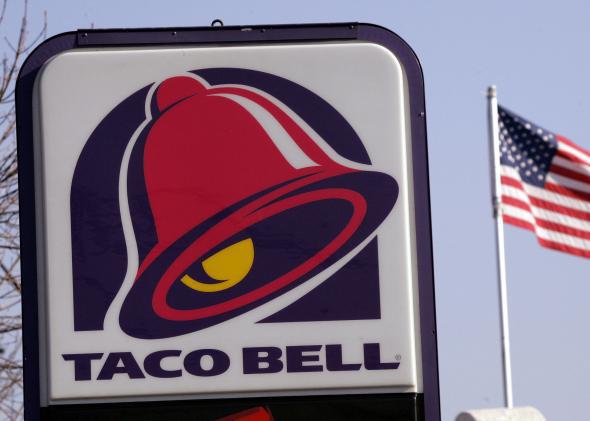We Have Real Beef We Have Real Beef Taco Bell Ad
Taco Bong's Seasoned Meat Is Only 88 Percent Beef. It Should Be Way, Fashion Less.

Taco Bell adds tons of non-meat ingredients to its meat. Good for Taco Bell!
Photograph by DON EMMERT/AFP/Getty Images
In 2011, an Alabama law firm filed a lawsuit against Taco Bell, challenge that the "seasoned beef" in its tacos and burritos was just 35 percentage beef. The fast-nutrient concatenation fired back past stating that the meat product was actually 88 percentage beef—and this week, Taco Bell has gone on the offensive by explaining in slap-up detail what the ingredients in that other 12 percent actually are.
In a new folio on the "Nutrition" section of its website, Taco Bell takes a faux-conversational tone to address such questions/exclamations as "Potassium chloride sounds like something from a science experiment, not a taco beef recipe!" and "Caramel colour and cocoa pulverisation? Those sound like they belong in desserts!" (The answer to the latter begins, "They probably exercise!" and so goes on to explain that the cocoa "helps our seasoned beef maintain a rich color.") The proliferation of exclamation points and the forced lightheartedness give the impression that Taco Bong is feeling defensive about its seasoned beef simply trying really hard non to audio defensive.
But Taco Bell shouldn't be defensive virtually the fact that its seasoned beefiness is only 88 percent beef. It should be proud. And Taco Bell and other fast-food chains should use more than fillers in their meat products, not less.
Most fast-food meat is very low quality—i written report of fast-food hamburgers plant that they contained connective tissue, blood vessels, peripheral nerves, adipose tissue, cartilage, and bone along with muscle tissue. To mask the flavor of peripheral nerves, fast-food meat is heavily seasoned, equally Taco Bell's seasoned beef exemplifies. (Taco Bell's new explainer page insists that they use "only USDA-inspected, 100% premium real beef, period"—merely that'south a meaningless phrase. All meat sold in the U.S. is USDA-inspected, and "premium" doesn't accept an official pregnant as a meat characterization; it's just marketing-speak.) When you bite into a McDonald's Quarter Pounder, you're mainly tasting "grill seasoning" and condiments, non beef; when yous taste a Burger King chicken asset—the third ingredient of which is "isolated oat product"—you're tasting salt and artificial flavorings.
Information technology follows that if fast food chains kept their proprietary seasonings simply replaced some of the animal ingredients with plant proteins like seitan, texturized vegetable protein, and Quorn, the taste wouldn't change discernibly. Vegetarian meat substitutes are mild plenty in flavor to exist able to blend in with the low-quality beef and chicken in your average fast-food sandwich. Most fake meat isn't identical to meat in texture (although more than convincing ones are invented every year), only when you're making a chicken nugget, a hamburger patty, or seasoned taco meat, texture doesn't thing that much. Fast nutrient meat is already highly processed, and I defy you to tell the difference in texture between a real chicken patty and a Gardein chicken patty.
Why should we want to substitute plant protein for some of the real meat in fast nutrient meals? Because information technology would brand a huge difference in terms of environmental degradation, public health, climate alter, and animal welfare. Half of Americans eat fast nutrient weekly, and fast food accounts for 11 per centum of adults' daily calorie intake. (I couldn't notice comparable global statistics, merely American fast nutrient chains are expanding quickly in China, Republic of india, and other newly industrialized countries.)
The demands of fast food chains accept an enormous bear upon on farm production, and if fast-food bondage started demanding half as much mill-farm meat, factory farms would have to scale back production considerably. Factory farms pollute the environment, torture animals, and overuse antibiotics, so the fewer of them there are, the better. And beef production in item is associated with greenhouse gas emissions, then less beefiness in your burger translates to lower carbon emissions. (This is to say nothing of the potential health benefits that consumers would enjoy if they ate less meat.)
If fast food leaders similar McDonald's and Taco Bell started replacing half of their meat with vegetable protein, they could potentially wearisome global warming, reduce the development of antibiotic-resistant bacteria, and prevent animal suffering—all without significantly diminishing the flavor of their products. It would be the winningest win-win in the history of winning.
And then I say: Bravo, Taco Bell, on making your seasoned beef only 88 percent meat. Add even more filler, and you just might salvage the world.
Source: https://slate.com/culture/2014/05/taco-bell-seasoned-beef-explainer-why-fast-food-chains-should-add-more-filler-to-their-meat.html
0 Response to "We Have Real Beef We Have Real Beef Taco Bell Ad"
Post a Comment